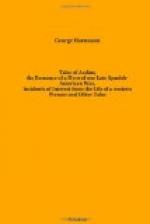As the poor man failed to say “See how fat,” he fell promptly into disfavor, which is equivalent to being blacklisted in our country.
The king’s general behaviour suggests that he deemed his blindness not merely to be a most regrettable misfortune, but that he regarded it as a deserved culpable affliction.
When a small boy I was told that he lost his eyesight through an act of charity. He drew a purse from his pocket, intending to give a beggar an aim when his horse shied violently, causing the steel-beaded tassels of the purse to injure his eyes.
Later, as I grew older, I heard a different tale:
The king as a student, then being crown-prince of the realm, found pleasure in looking at the wine which was red, and at a pair of eyes that were blue and shone like heavenly stars, oh so gently and tenderly! But he looked, alas, once too often—into eyes that blazed with lurid flames of hate and fury—the terrible eyes of the green-eyed monster. There came a flash as of lightning with a loud report and he saw stars that fell fiercely fast until they vanished under a cloud of awful gloom in the hopeless despair of perpetual night; but the glorious luminous star of day for him shone not again, nevermore, on earth! To this day I know not which version tells the truth.
The castle’s grand hall was overflowing with people. I followed in the wake of father, who had fallen into line, advancing gradually toward the august presence of a crowned king. Nervously father awaited his turn to bask for one anxious moment in the sunshine of royal favor and touch a king’s hand.
I slipped away unperceived to the kitchen, knowing well the premises of this fine old castle which was kept in good repair by the city of Hamburg, its present owner. It had been won by conquest of arms in 1394 A.D. from the noble family “Von Lappe.”
The principal occupation of these knights was the waylaying and robbing of merchants; but the wrecking of ships was their favorite, most profitable pastime.
The kitchen was in the basement of the castle and great in size, its floor paved with slabs of stone, the walls and ceilings were paneled in oak. On one side of the room were stone-hearths with blazing fires, over which hung pots and brazen kettles. Game and meats broiled on spits, there being no cook-stoves in those days. Heavy doors, strapped with great wrought iron hinges and studded with ornamental scroll-work led into pantries and cellars.
The place swarmed with liveried servants and cooks; also the king had brought his “chef de cuisine and own butler. The latter, a lordly Englishman, was a grand, haughty person who superintended the extravagant preparations for the entertainment of royalty.
A maid conducted me to a corner where I was out of harm’s way and regaled me with delicacies when the courses were served, oh it was fine! The chef prepared certain dishes for the king and I saw the butler taste of the viands that were placed on crown-marked dishes of porcelain and gold. He also tasted the king’s wine.




